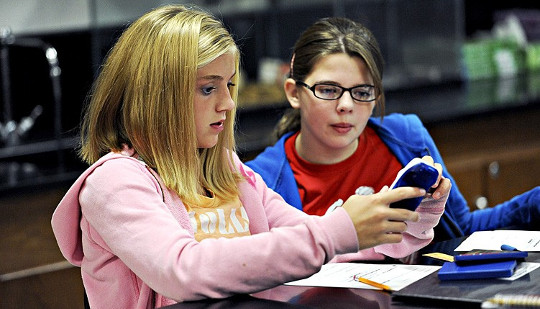
We have been hearing stories about academic cheating: from students caught cheating on homework assignments as well as college entrance exams to teachers being caught in cheating scandals, such as the ones in Atlanta, Georgia, and Columbus, Ohio.
Today, between 75% and 98% of college students surveyed each year report having cheated in high school. So, if cheating is happening at that large a scale, is it just inevitable? And can we even blame our students?
In order to figure out how to answer these questions, it’s important to consider why students cheat in the first place. Although the obvious reason seems to be the desire of students to get ahead (eg, to get a good grade, or to avoid a punishment), the real reason is actually a bit more complicated.
Academic Goals Matter
When students do their schoolwork (which includes everything from daily homework assignments to major examinations), they usually have certain goals in mind. These goals vary from one academic task to another.
In other words, if you were to ask a student, “What is your goal in taking next week’s chemistry test?”, the student should be able to tell you what she wants to get out of the experience.
My colleagues and I have been studying the psychology behind academic cheating for the past two decades, and we have found that students’ goals in their academic tasks are related in very predictable ways to their likelihood of cheating. Research also indicates that teachers and parents can influence those goals, and thus potentially deter cheating.
If the sole reason for engaging in an academic task is to get a good grade, then it’s probably easy for a student to justify the act of cheating.
As my colleagues and I found, some students might have short-term reasons. For instance, for some students, it might be as simple a motivation as the desire to go to a friend’s party on Saturday night. If they think that their parents will not let them go if they fail the test, they might take the easier option to cheat, to be able to go to the party.
For some others, it might be a longer-term reason: They might want a good salary and other luxuries in their adult life and believe that the only path to those things would be a good college. And they might be willing to cheat on their tests to be able to get ahead in their future.
Students Have Different Goals
Whereas these reasons may seem selfish and shortsighted to some adults, to many adolescents, who are still unable to consider the consequences of their actions, these goals may seem perfectly reasonable.
We refer to these goals as “extrinsic” goals. Research indicates that students who experience classrooms in which extrinsic goals are common are more likely to cheat.
Clearly, not all students have these goals. Some students are motivated by their desire to learn.
So, for some students, the goal might be to truly understand and master the material that is being studied. In other words, whereas some students might have a goal of getting a good grade on a chemistry test in order to get something (eg, to go to a party), others might have the goal of truly learning chemistry: “I want to understand chemistry because I want to develop drugs to help fight cancer; I know that understanding chemistry is essential for me to be successful in this career.”
We refer to these goals as “mastery” goals. Research indicates that students who experience classrooms in which mastery goals are valued and encouraged are less likely to cheat.
If one thinks about this, it starts to make sense. When students are learning in classrooms where the teacher truly values mastery of the academic content (as opposed to getting a good grade on an assessment), then “cheating” really doesn’t offer any benefits to the students.
Teachers Can Help
The ways in which assessments of student learning are administered are particularly relevant in discussions of academic cheating. If results of assessments ultimately come down to a grade on a test or an assignment (eg, an “A” or an “F”), then students often will come to value the grade more than what they are actually learning.
However, if, in contrast, the assessment truly focuses on a demonstration of mastery of content, then students will focus on mastering that content and not just on getting an “A.”
When students have to demonstrate mastery of material, cheating doesn’t serve much of a purpose – if you truly have to show the teacher that you understand and can apply the information that you learned, then cheating won’t buy you any shortcuts.
Fortunately, there are strategies that educators can use to facilitate students’ adoption of mastery goals instead of extrinsic goals.
Here Are A Few Suggestions, Based On Our research:
-
Make sure that assignments and exams require students to demonstrate mastery of content, as opposed to just requiring the regurgitation of memorized facts.
-
When students do not demonstrate mastery on an assignment or a test, allow them to redo the assignment. Educators sometimes don’t think that this recommendation is fair – after all, if one student gets all of the answers right the first time, why should someone else get a second chance? But, if the goal is really to learn or “master” the content, then does it really matter if the student gets a second chance?
-
Avoid high-stakes, one-time assessments.
-
Always provide students’ grades privately – don’t share results publicly or display distributions of scores; students often will cheat in order to avoid looking “dumb.”
Ultimately, some students will inevitably cheat. But, by considering why students are doing various academic tasks in the first place and helping them set their “mastery” goals, educators can make a significant dent in the epidemic of academic cheating.
About The Author
![]()
 Eric Anderman is Professor, Educational Psychology at The Ohio State University. His research interests are : Academic motivation; adolescent development; prevention of risky behaviors in adolescent populations; research methods in social science.
Eric Anderman is Professor, Educational Psychology at The Ohio State University. His research interests are : Academic motivation; adolescent development; prevention of risky behaviors in adolescent populations; research methods in social science.
This article was originally published on The Conversation. Read the original article.


























